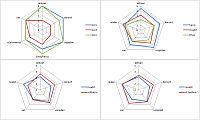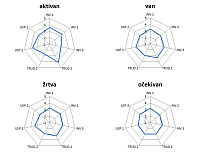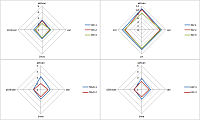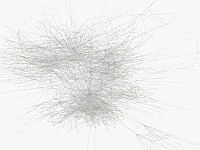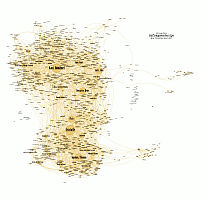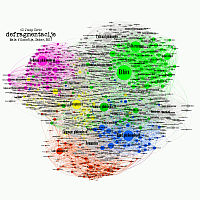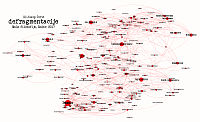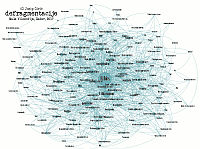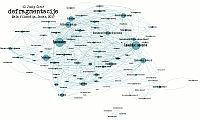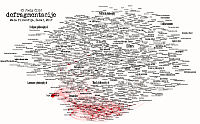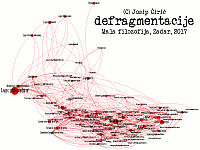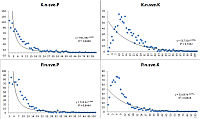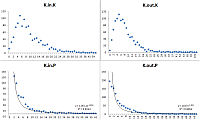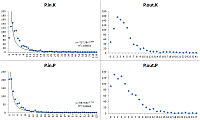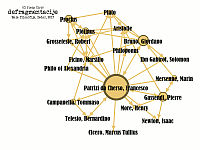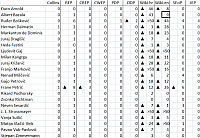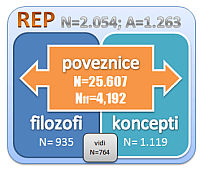 download | table of content | from reviews | galleries
download | table of content | from reviews | galleries
Table of content:
The book defragmentations consists of four studies about links between philosophy and disability studies, application of complex network analysis, popular culture and moral panic arguments.
The first part is made of two short studies: from information ethics there is a study about video-games and the ecology of related moral panic arguments. On situational ethics and anarchistic aesthetics there is a short paper on Slovenian rock-group Bulldozer.
The second part is about links between philosophy and disability studies, an area of minority studies focused on inquiry of social, political, philosophical and anthropological issues considering persons with disabilities. Philosophy is understood as conceptual engineering, so th econcept of 'subheroic narrative' is presented as a model of understanding attribution in overcoming disability narrative. The results of empirical analysis confirms the approach and indicates a need to research further into understandin of disability narrative.
The third part is on application of social network analysis in the history of philosophy. Network analysis is becoming ever more frequent approach to analyse data in every scientific area, from natural science, biotechnology to humanities. Randall Collins made a breakthrough in providing social network of the history of the world philosophy. Analyzing links in encyclopedic articles in Routledge Encyclopedia of Philosophy we demonstrate foundation of Collins' theory of intellectual capital.
- foreword
- I. two miniatures
- II. subheroic narrative
- disability studies and philosophy
- disability, impairment and paradigmatic approaches
- life narrative
- neither hero nor victim
- the concept of subhero
- III. mapping the philosophy
- metaphilosophy
- complex network analysis
- Collins' sociology of philosophies
- Routledge Encyclopedia of Philosophy from the network perspective
- REP and the confirmation of Collins' socological realism in the history of philosophy
- (un)representation of Croatian philosophers in the philosophical encyclopedias
- illustration: Frane Petrić
- illustration: Juraj Dragišić
- heretical postscript
from the reviews

Rock, Yugoslavia in the seventies and the eighties of the last century, self-governing socialism, video games, moral panic, persons with disabilities, metaphilosophy, complex networks analysis, etc. - Perhaps a better title would be Fragments, not Defragmentations. When we add to this the fact that the author himself is a rocker and a fan of video games, a person with a disability and a philosopher, the title might have been Fragments and Testimonies. Indeed, the manuscript has in some way a confessional dimension, but not in the sense of remorse or conversion, but in the sense of the author's self-conscious testimony about himself and his own experience of the world, of life and philosophy-as a rocker, a video game devotee, a person with a disability, and a philosopher and how he perceives the world, life and philosophy. I would say that in this quadrilateral the main 'sin' is philosophy, and that the manuscript in its entirety is actually a metaphilosophical undertaking, in which the author wants to say, or show what philosophy is and what by nature it should be. So, as the author himself points out in heretical postscript with this book, whether we wanted it or not, philosophy is an activity, like other human activities, which gathers interested individuals in the community (the philosopher community). This community shows in the course of its history the ever-growing repercussions: firmly adhering to some of its sacred places, which poorly protects from any criticism from outside, is inclined to isolate, separate both from other sciences and from life. This gradually made it a 'distant coast', to which almost no one goes any further, neither from other sciences, nor from everyday life. A coast which no one any longer holds any importance to. A coast which is fading out, but in its own fading does not percieves the problem within itself. Instead, with a paternalizing, exalted, in high-style locates the problem 'the other', in mundane sciences and in this mundane life of ours, with which does not want to meddle. However, this is the fifth sinner's sin, the metaphysical and the heretical, its R'n'R-like, Buldozer-like and profound rebellion against its own professional community, against the professional philosophy perceived as a special, exalted human activity, which does not fit to go among mortals, touch their mundane lives and real-life's problems. It is rebellion against the view that philosophy is not to connect with completely ordinary, unexalted natural, medical, technical, or social sciences. From this rebellion, in this philosophical manuscript, the themes in philosophy are unusual (such as rock-group Buldozer, video games and disability). Hence the application of method unusual to philosophy that the author constantly applies in this manuscript - exact, empirical. They are in fact a necessary part of a wider author's defragmentation project of philosophy, its integration into the world of science and life, both in the direction of popularization and philosophical counseling. I would say a healthy approach, vital, in the author's performance, especially spiced with the pleasure of provoking - for example, Rabelais' author preferring Buldozer's culinary definition of life (pepperon, short but hot), in contrast to the exalted but lifeless existentialists' emptiness, absurdity. In short, the autoironic approach to philosophy, consistently implemented, is a novelty in our philosophical literature.
Dario Škarica, associate prof., Institut of philosophy, Zagreb

The theme of the work is both scientifically and professionally relevant. According to the reviewer, the work is theoretically grounded, the argumentation is systematically derived, and the conclusions are clear and consistent. The author shows the knowledge of modern trends from the perspective of philosophy - the need for the popularization of philosophy through the themes of popular culture (music and video games), the applicability of philosophy in everyday life and solving everyday problems (philosophical counseling), and the use of computers and computer-based technology in the analysis of complex networks of individuals / institutions and scientifically specialized topics (application of bibliometric and visualization methods and techniques). The work also gives a completely new, critically and scientifically grounded and relevant one, and within the domestic context, an applied view of philosophy as a discipline which at the same time freely gives and responsiblely borrows scientific methods and concepts.
The work is primarily intended for the professional public and students, but also for the general public who wants to get acquainted with the popular and practical aspects of philosophy, and the possibilities of applying the analysis of complex interpersonal and thematic networks in the field of philosophy.
The four separate studies collected in this work speak of the openness of philosophy to other topics and networks. The work brings an important view of interperesional networks in philosophy as well as the degree of interconnection of philosophical concepts using bibliometric methods and graph theory. The work is as relevant as it is on a global scale, both because of the monitoring of new trends and the systematic development of national terminology that follows these trends.
Franjo Pehar, assistant prof., LIS Dept., Zadar University

